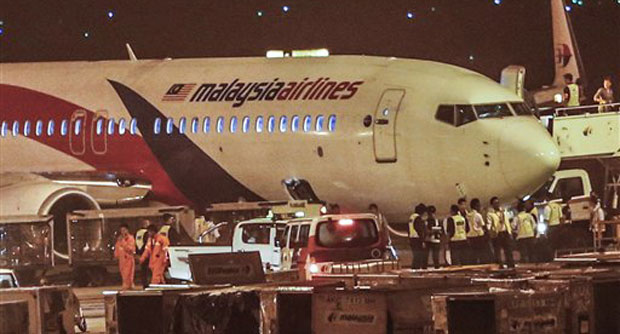Australia flags deeper search for Malaysian jet

Ground crew check the Malaysia Airlines flight MH192 bound for Bangalore that turned back towards and parked at Kuala Lumpur International Airport in Sepang, Malaysia, Monday, April 21, 2014, after its right landing gear malfunctioned upon takeoff. The airline says Flight 192 carrying 166 people landed safely at the Kuala Lumpur International Airport early Monday, four hours after it departed. AP
CANBERRA, Australia—The hunt for the missing Malaysia Airlines jet will likely soon deploy more powerful sonar equipment that can delve deeper as the current search of the most likely crash site in the Indian Ocean has failed to yield any clues, Australia’s defense minister said Wednesday.
The search coordination center said Wednesday a robotic submarine, the U.S. Navy’s Bluefin 21, had so far covered more than 80 percent of the 310-square-kilometer (120-square-mile) seabed search zone off the Australian west coast, creating a three-dimensional sonar map of the ocean floor. Nothing of interest had been found.
The 4.5-kilometer (2.8-mile) deep search area is a circle 20 kilometers (12 miles) wide around an area where sonar equipment picked up a signal on April 8 consistent with a plane’s black boxes. The black box beacons’ batteries would by now be dead.
Defense Minister David Johnston said Australia was consulting with Malaysia, China and the United States on the next phase of the search for the plane that went missing March 8, which is likely to be announced next week.
Johnston said more powerful towed side-scan commercial sonar equipment would probably be deployed, similar to the remote-controlled subs that found RMS Titanic 3,800 meters (12,500 feet) under the Atlantic Ocean in 1985 and the Australian WWII wreck HMAS Sydney in the Indian Ocean off the Australian coast, north of the current search area, in 2008.
“The next phase, I think, is that we step up with potentially a more powerful, more capable side-scan sonar to do deeper water,” Johnston told The Associated Press.
While the Bluefin had less than one-fifth of the seabed search area to complete, Johnston estimated that task would take another two weeks.
“We want to be very thorough,” he said.
The Bluefin’s first 16-hour sea floor mission last week was aborted because the water depth exceeded its 4.5 kilometer safety limit. Johnston said it was possible that wreckage had been missed in that deep water.
The focus of next phase of the seafloor search whether it will include the initial search area would be decided on by continuing analysis of information including flight data and sound detections of suspected beacons, he said.
“We are currently gathering all of the facts together to mount a further assault on the most likely location, given all the facts,” he said. “But can I say, it is one hell of a vast area.”
“A lot of this seabed has not even been hydrographically surveyed before — some of it has — but we’re flying blind,” he said, adding that the seabed in the vicinity of the search was up to 7 kilometers (4 miles) deep.
“The whole thing is extraordinarily complex in one of other most isolated parts of the ocean on the planet in very deep water,” he added.
The air search for debris would likely continue until a new search phase was announced next week, he said.
The search center said up to 10 planes and 12 ships would join Wednesday’s search of an expanse covering 38,000 square kilometers (14,500 square miles), centered 1,600 kilometers (1,000 miles) northwest of the city of Perth.
Radar and satellite data show the jet carrying 239 passengers and crew veered far off course on March 8 for unknown reasons during a flight from Kuala Lumpur, Malaysia, to Beijing. Analysis indicates it would have run out of fuel in the remote section of ocean where the search has been focused. Not one piece of debris has been recovered since the massive multinational hunt began.
RELATED STORIES
Anwar: Malaysia hiding information on lost jet
Novel analysis helped narrow Malaysian jet search